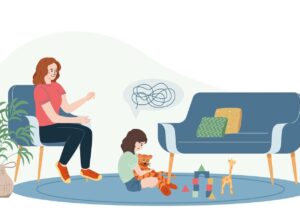Parents – Did You Know ? It Isn’t Only About Your Child
This article has been researched and written by Sara Caroppo. AI has not been used in producing this article.
One of the most common things parents say when walking into the therapy room is: “We just need some help with our child’s behavior.”
It makes perfect sense. When a child is struggling — especially in ways that are disruptive or emotionally intense—the instinct is to focus on the child as the source of the problem. What often goes unnoticed, however, is how deeply a child’s behavior is connected to their environment, particularly to the tone, reactions, and emotional cues of their caregivers.
Why Is it important to work with parents too?
As a Child Psychologist, I work closely with parents. Not to judge or criticize, but because parenting plays a central role in shaping how children learn to regulate their emotions, respond to challenges, and build relationships. Change begins in the family system, not just within the child.
Everyday Parenting and Behavioral Psychology:
Many parents are already applying psychology in daily routines—often without realizing it.
- Positive reinforcement happens when a parent praises a child for helpful behavior, such as tidying their room. If sincere and consistent, this praise increases the likelihood of the behavior being repeated.
- Negative punishment involves removing a valued item or privilege, such as screen time, following unwanted behavior. The goal is to decrease that behavior over time.
These ideas go back to BF Skinner’s work in behavioral psychology. In his famous “Skinner’s Box” experiments, he showed how behavior can be shaped by rewards or by removing rewards. Children, like adults, respond to environments in patterned ways. If misbehavior consistently draws attention, it is reinforced. If calm behavior is ignored, it may fade. These quiet associations can be remarkably enduring.
When Effort Begins to Fade
Another important concept is learned helplessness, developed by psychologists Martin Seligman and Steven Maier.
This occurs when, after repeated setbacks or unclear responses from caregivers, a child begins to believe their efforts don ‘t make a difference. Over time, they may stop trying altogether.
Children in this state may appear anxious, disengaged, angry, or unusually passive. This is rarely laziness or defiance. More often, it signals that something important has been missed. When adult feedback is unpredictable or overly critical, even well-intentioned children can lose confidence in their ability to create change.
The Messages Behind the Moments
Every interaction between parent and child carries meaning. A raised eyebrow, a soft tone, a pause, a quick reaction—all of these shape a child’s understanding of themselves and the world. That’s why child therapy often begins with parents reflecting on the messages they send, often unintentionally. Behavior is never random—it’s communication, a response to what the child has learned about safety, connection, and expectation.
When parents respond with more awareness and consistency, the change is often visible in the child. Parental involvement is not simply part of the process—it is the process.
How to Talk to Your Child About Body Safety – Without Creating Fear
Body safety talks don’t have to be and shouldn’t be scary. When these conversations are calm …
ADHD in Girls vs. Boys: Why Symptoms Often Look Different
When people think of ADHD, they often picture a young boy bouncing off the walls, constantly moving, talking out of turn, or …
How Psychoeducational Assessments Help Shape Better Learning Plans in School
No two children are the same. Every child brings a unique mix of strengths, challenges, and ways of …
Can Relationship Counseling Work for Toxic Relationships?
Relationships can be complicated, emotional, and at times, painful. While every couple experiences ups and downs, some relationships …
10 Signs You May Have Anxiety
Anxiety is a normal and natural human response to stress, danger, or uncertainty. However, when anxiety becomes excessive, it can …
Child Sleepwalking and Talking: What You Need to Know
Childhood is a time of rapid development, filled with new experiences—and sometimes, surprising nighttime behaviors.
Questions a Child Psychologist Might Ask
When preparing for your child’s first appointment with a psychologist, it’s natural to feel curious—or even a little anxious—about what …
55 Love Questions for Couples to Deepen Your Relationship
In any relationship, communication is key. Whether you’re just starting out or have been together for years, asking meaningful
Stress vs. Anxiety vs. Burnout: How to Recognize the Difference
In today’s fast-paced world, understanding the differences between stress, anxiety, and burnout is crucial for …
Relocation Depression: Definition and Ways to Cope
Relocation depression, also known as moving depression, is a form of situational depression that arises from the stress …











